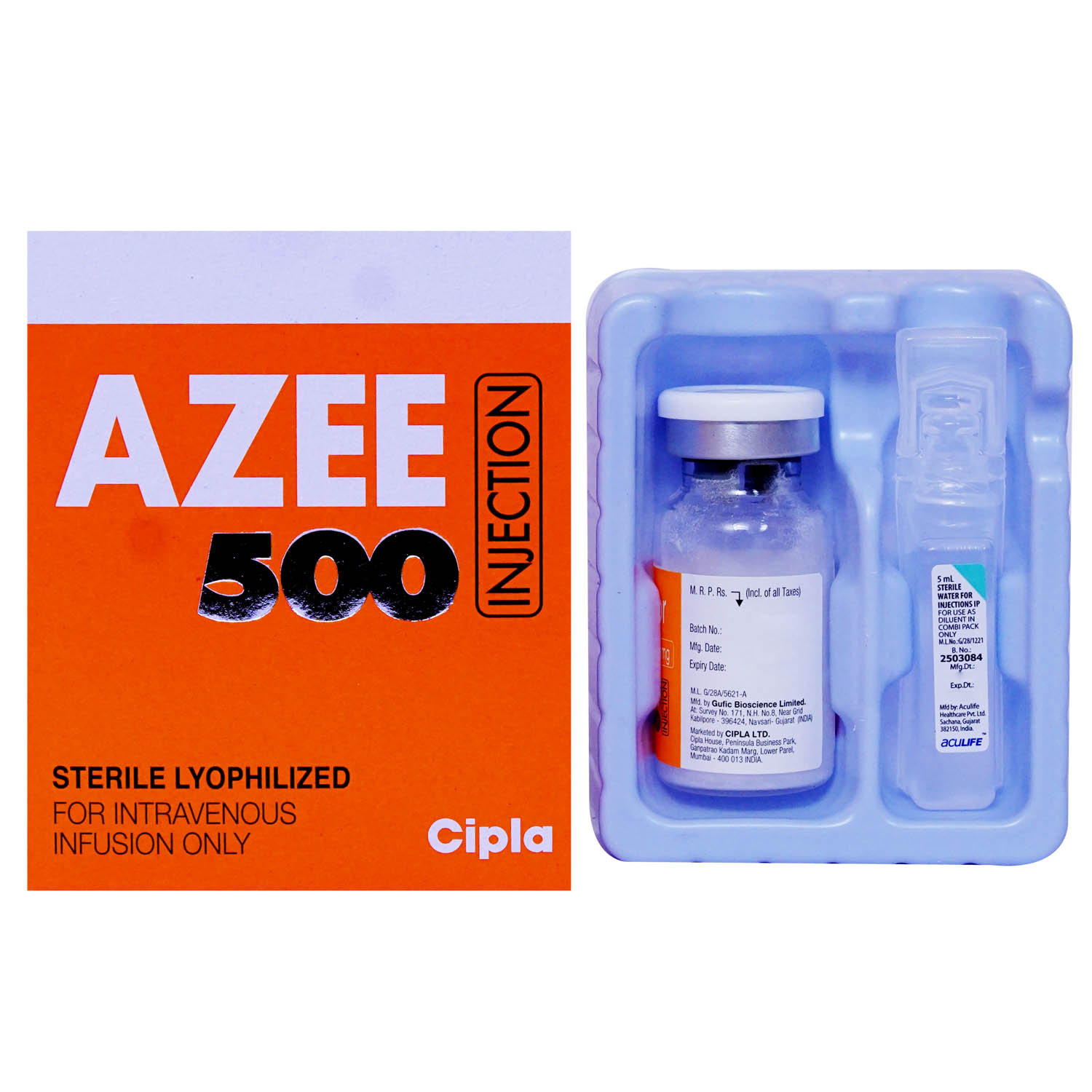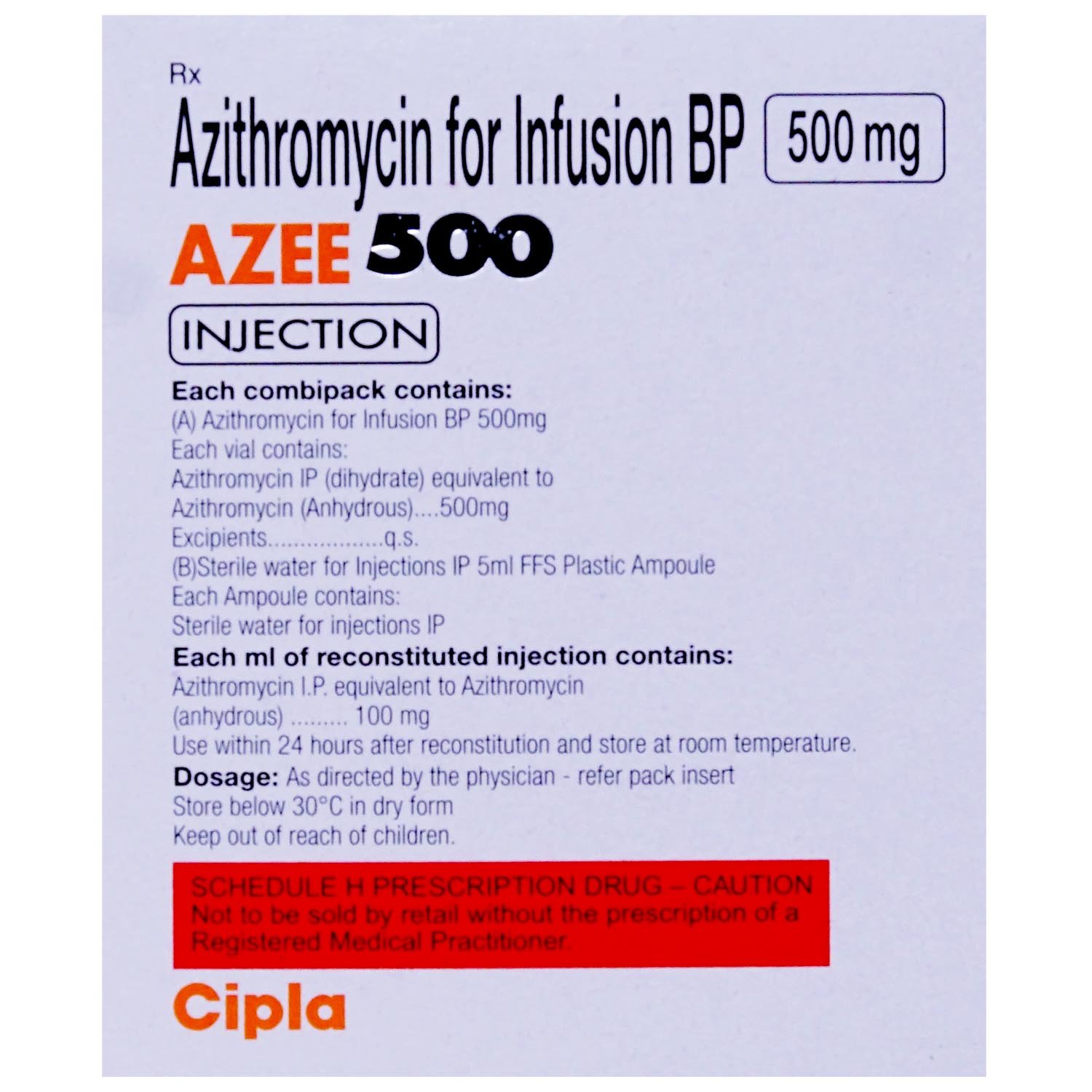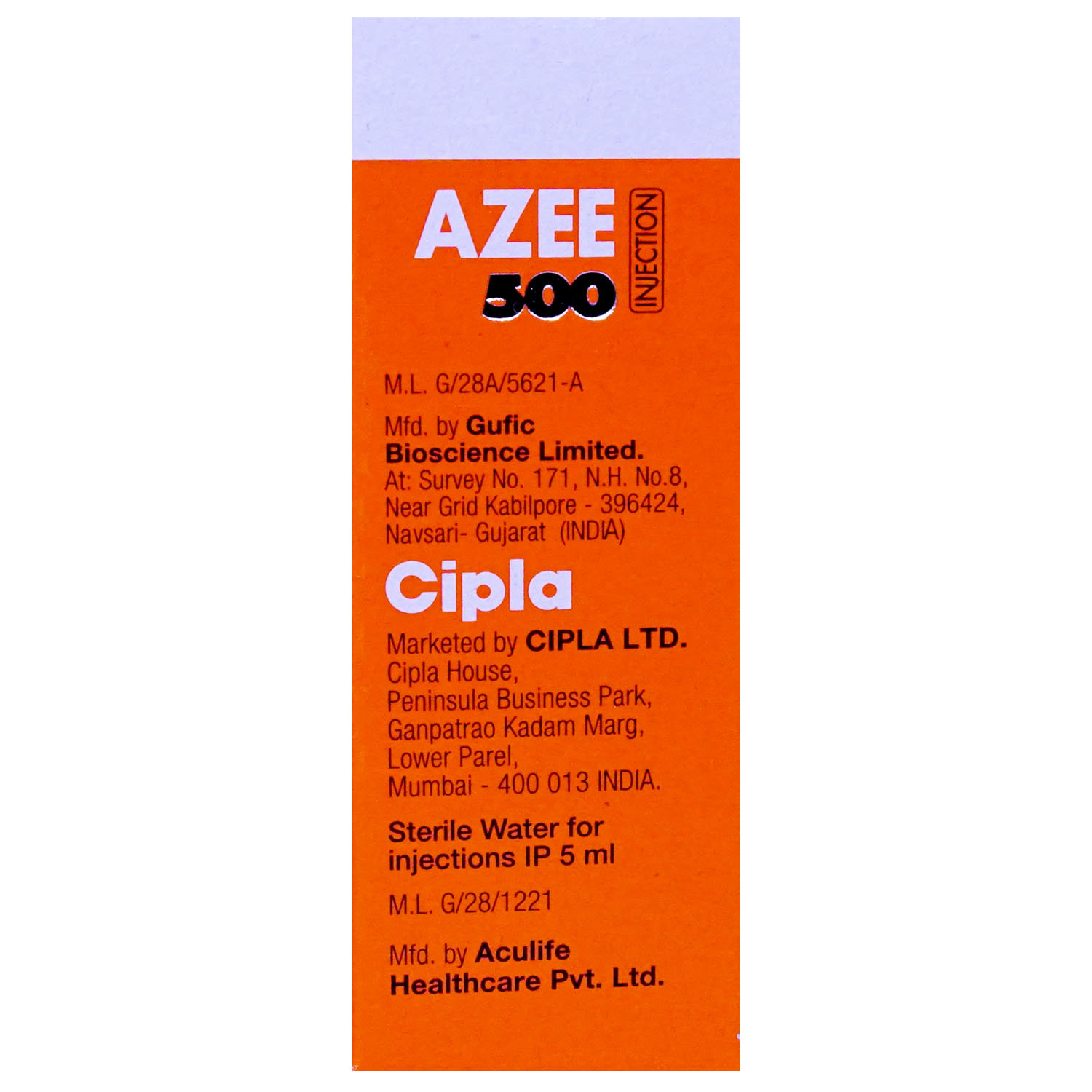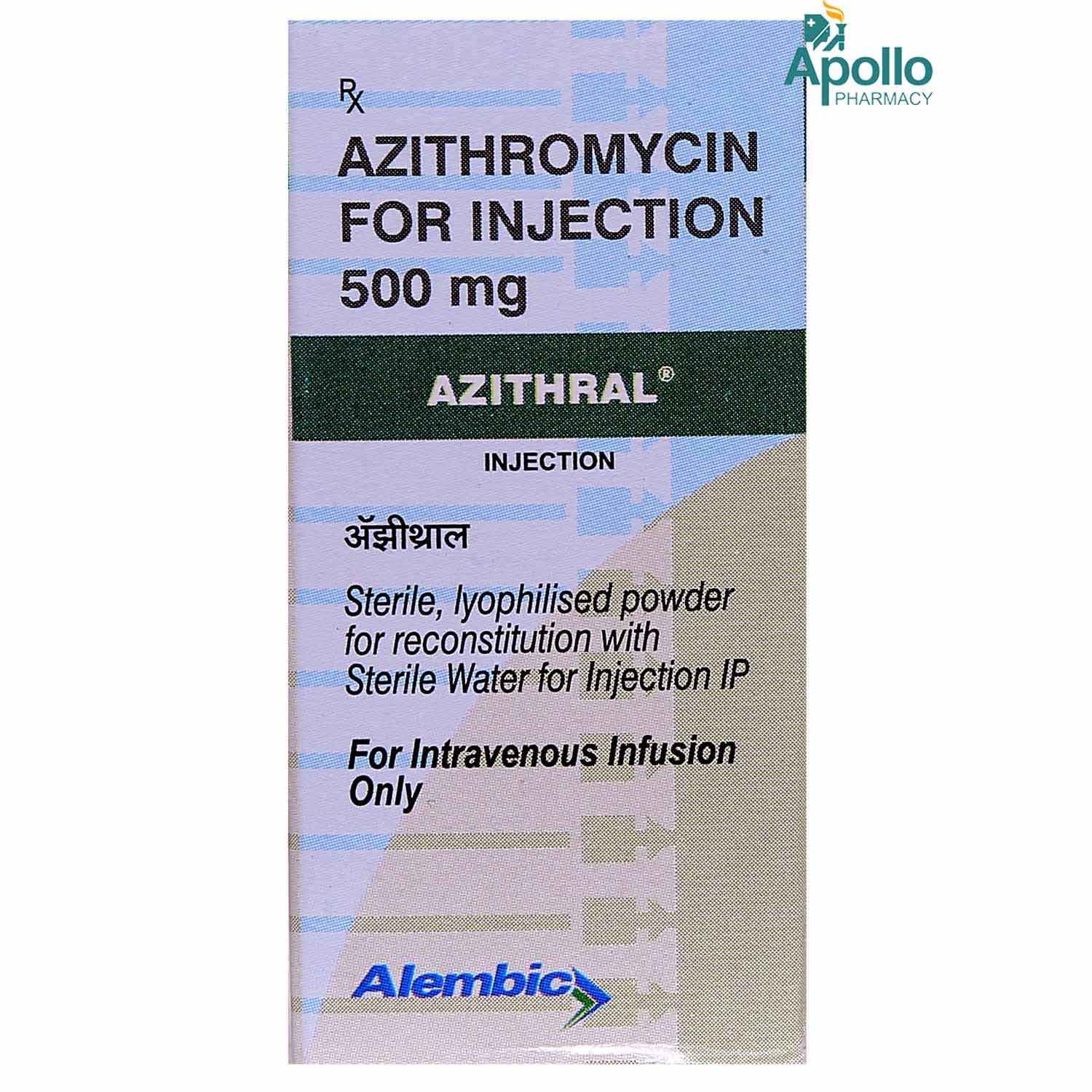Azee 500 Injection 5 ml
MRP ₹214.5
(Inclusive of all Taxes)
₹25.7 Cashback (12%)
Provide Delivery Location
Online payment accepted
 Prescription drug
Prescription drugWhats That
Composition :
Manufacturer/Marketer :
Consume Type :
Expires on or after :
Return Policy :
NPPA :
About Azee 500 Injection 5 ml
Azee 500 Injection 5 ml belongs to the group of medicines known as macrolide antibiotics used to treat infections caused by bacteria. It is prescribed for treating severe infections or when oral therapy is ineffective. Azee 500 Injection 5 ml is indicated in pneumonia (lung infection) and pelvic infections (infection of the reproductive organs). A bacterial infection is a condition in which bacteria grow in the body and cause infection. It can target any body part and multiply very quickly.
Azee 500 Injection 5 ml contains 'Azithromycin', which works by killing the bacteria that cause the infection by preventing the synthesis of essential proteins necessary for the survival of the bacteria. Thereby, it effectively treats bacterial infections.
Azee 500 Injection 5 ml will be administered by a healthcare professional; do not self-administer. You may experience pain, itching, swelling or redness at the site of injection, stomach cramps, nausea, diarrhoea, wind, dizziness, headache, and indigestion. Most of these side effects of Azee 500 Injection 5 ml do not require medical attention and gradually resolve over time. Please consult your doctor if these side effects become troublesome.
Inform your doctor if you are pregnant, suspect you are pregnant, plan to have a baby or if you are breastfeeding; your doctor will prescribe Azee 500 Injection 5 ml only if the benefits outweigh the risk. Let your doctor know if you have/had liver problems; your doctor may need to monitor your liver function. Let your doctor know about your medical condition and the medications you are taking to avoid any interactions. Azee 500 Injection 5 ml may cause visual problems, do not drive or use machinery unless you are alert.
Uses of Azee 500 Injection 5 ml
Directions for Use
Key Benefits
Azee 500 Injection 5 ml belongs to the group of medicines known as macrolide antibiotics used to treat infections caused by bacteria such as pneumonia (lung infection) and pelvic infections (infection of the reproductive organs). Azee 500 Injection 5 ml works by preventing the production of proteins required by the bacteria for its survival. Thereby kills the bacteria and treats infections. Azee 500 Injection 5 ml is prescribed for treating severe infections or when oral therapy is ineffective.
Storage
- Inform Your Doctor: Notify your doctor immediately about your diarrhoea symptoms. This allows them to adjust your medication or provide guidance on managing side effects.
- Stay Hydrated: Drink plenty of fluids to replace lost water and electrolytes. Choose water, clear broth, and electrolyte-rich drinks. Avoid carbonated or caffeinated beverages to effectively rehydrate your body.
- Follow a Bland Diet: Eat easy-to-digest foods to help firm up your stool and settle your stomach. Try incorporating bananas, rice, applesauce, toast, plain crackers, and boiled vegetables into your diet.
- Avoid Trigger Foods: Steer clear of foods that can worsen diarrhoea, such as spicy, fatty, or greasy foods, high-fibre foods, and dairy products (especially if you're lactose intolerant).
- Practice Good Hygiene: Maintain good hygiene to prevent the spread of infection. To stay healthy, wash your hands frequently, clean and disinfect surfaces regularly, and avoid exchanging personal belongings with others.
- Take Anti-Diarrheal Medications: If your doctor advises, anti-diarrheal medications such as loperamide might help manage diarrhoea symptoms. Always follow your doctor's directions.
- Keep track of your diarrhoea symptoms. If they don't get better or worse or are accompanied by severe stomach pain, blood, or dehydration signs (like extreme thirst or dark urine), seek medical help.
- Inform your doctor about the nausea and discuss possible alternatives to the medication or adjustments to the dosage.
- Divide your daily food intake into smaller, more frequent meals to reduce nausea.
- Opt for bland, easily digestible foods like crackers, toast, plain rice, bananas, and applesauce.
- Avoid certain foods that can trigger nausea, such as fatty, greasy, spicy, and smelly foods.
- Drink plenty of fluids, such as water, clear broth, or electrolyte-rich beverages like coconut water or sports drinks.
- Use ginger (tea, ale, or candies) to help relieve nausea.
- Get adequate rest and also avoid strenuous activities that can worsen nausea.
- Talk to your doctor about taking anti-nausea medication if your nausea is severe.
- Record when your nausea occurs, what triggers it, and what provides relief to help you identify patterns and manage your symptoms more effectively.
- Drink water or other clear fluids.
- To prevent worsening of pain, limit intake of tea, coffee, or alcohol.
- Include bland foods like rice, toast, crackers, and rice in your diet.
- Avoid lying down immediately after eating as it may cause indigestion or heartburn.
- Avoid acidic and spicy food as it may cause indigestion.
- Inform Your Doctor: Notify your doctor immediately about your diarrhoea symptoms. This allows them to adjust your medication or provide guidance on managing side effects.
- Stay Hydrated: Drink plenty of fluids to replace lost water and electrolytes. Choose water, clear broth, and electrolyte-rich drinks. Avoid carbonated or caffeinated beverages to effectively rehydrate your body.
- Follow a Bland Diet: Eat easy-to-digest foods to help firm up your stool and settle your stomach. Try incorporating bananas, rice, applesauce, toast, plain crackers, and boiled vegetables into your diet.
- Avoid Trigger Foods: Steer clear of foods that can worsen diarrhoea, such as spicy, fatty, or greasy foods, high-fibre foods, and dairy products (especially if you're lactose intolerant).
- Practice Good Hygiene: Maintain good hygiene to prevent the spread of infection. To stay healthy, wash your hands frequently, clean and disinfect surfaces regularly, and avoid exchanging personal belongings with others.
- Take Anti-Diarrheal Medications: If your doctor advises, anti-diarrheal medications such as loperamide might help manage diarrhoea symptoms. Always follow your doctor's directions.
- Keep track of your diarrhoea symptoms. If they don't get better or worse or are accompanied by severe stomach pain, blood, or dehydration signs (like extreme thirst or dark urine), seek medical help.
- Tell your doctor about your GAS symptoms. They may change your medication regimen or prescribe additional drugs to help you manage them.
- To manage GAS symptoms, eat a balanced diet of fibre, vegetables, and fruits.
- Drink enough water throughout the day to avoid constipation and treat GAS symptoms.
- Regular exercise like yoga and walking may help stimulate digestion and alleviate GAS symptoms.
- Take probiotics only if your doctor advises, as they may help alleviate GAS symptoms by promoting gut health.
- Take medication for GAS symptoms only if your doctor advises, as certain medications can interact with your existing prescriptions or worsen symptoms.
- If symptoms persist, worsen, or are accompanied by severe abdominal pain, vomiting, or bleeding, seek immediate medical attention.
- Avoid taking raw fruits, nuts and vegetables.
- Do not share your personal things with others like toothbrushes.
- Clean the wounds and cuts using soap and water.
- Wash your hands thoroughly and frequently and maintain hygiene.
- Get a good quality of sleep.
- Preventing Vomiting (Before it Happens)
- Take medication exactly as prescribed by your doctor. This can help minimize side effects, including vomiting.
- Having a small meal before taking your medication can help reduce nausea and vomiting.
- Talk to your doctor about taking anti-nausea medication along with your prescribed medication.
- Managing Vomiting (If it Happens)
- Try taking ginger in the form of tea, ale, or candy to help alleviate nausea and vomiting.
- What to Do if Vomiting Persists
- Consult your doctor if vomiting continues or worsens, consult the doctor for guidance on adjusting your medication or additional treatment.
Drug Warnings
Do not take Azee 500 Injection 5 ml if you are allergic or hypersensitive to azithromycin, any of its ingredients, any other macrolide antibiotic or ketolide (macrolide derivatives), or if you are taking ergotamine (used to treat migraine). Consult your doctor if you are pregnant or breastfeeding. Inform your doctor if you have/had myasthenia gravis, psychiatric disorders, migraine, heart, kidney or liver problems.
Drug-Drug Interactions
Drug-Drug Interactions
Login/Sign Up
Co-administration of Azee 500 Injection 5 ml with Ziprasidone can increase the risk of irregular heart rhythm.
How to manage the interaction:
Although there is an interaction between Ziprasidone and Azee 500 Injection 5 ml but can be taken together if prescribed by a doctor. Contact a doctor immediately if you experience sudden dizziness, lightheadedness, fainting, shortness of breath. Do not discontinue any medications without consulting a doctor.
Taking Azee 500 Injection 5 ml with ribociclib increases the risk of an abnormal heart rhythm.
How to manage the interaction:
Although administration of Azee 500 Injection 5 ml alongside ribociclib can result in an interaction, it can be taken if a doctor has advised it. However, if you experience sudden dizziness, lightheadedness, fainting, breathing difficulty, or rapid heartbeat, consult the doctor immediately. Do not stop any medications without a doctor's advice.
Azee 500 Injection 5 ml increases the levels of protamine in the blood, which may increase its effects.
How to manage the interaction:
Although taking Protamine and Azee 500 Injection 5 ml together may cause an interaction, it can be taken if a doctor has suggested it. Do not discontinue any medications without consulting a doctor.
Taking Azee 500 Injection 5 ml with iloperidone increases the risk of an abnormal heart rhythm.
How to manage the interaction:
Though administration of Azee 500 Injection 5 ml alongside iloperidone can result in an interaction, it can be taken if a doctor has advised it. However, if you experience sudden dizziness, lightheadedness, fainting, shortness of breath, or rapid heartbeat, get medical treatment immediately. Do not discontinue any medications without consulting a doctor.
Taking Azee 500 Injection 5 ml with bedaquiline may increase the risk of an abnormal heart rhythm.
How to manage the interaction:
Although using Azee 500 Injection 5 ml alongside bedaquiline can result in an interaction, it can be taken if a doctor has advised it. However, if you experience sudden dizziness, lightheadedness, fainting, breathing difficulty, or rapid heartbeat, consult the doctor immediately. Do not stop any medications without a doctor's advice.
Taking Azee 500 Injection 5 ml with Moxifloxacin increases the risk of an abnormal heart rhythm.
How to manage the interaction:
Although administration of Azee 500 Injection 5 ml alongside Moxifloxacin can result in an interaction, it can be taken if a doctor has advised it. However, if you experience dizziness, breathing difficulty, or rapid heartbeat, consult the doctor immediately. Do not stop any medications without a doctor's advice.
Coadministration of Azee 500 Injection 5 ml with nilotinib can increase the risk or severity of irregular heart rhythms. The risk increases in patients with a history of heart illness or electrolyte imbalance.
How to manage the interaction:
Although administration of Azee 500 Injection 5 ml alongside nilotinib can result in an interaction, it can be taken if a doctor has advised it. However, if you experience sudden dizziness, breathing difficulty, or rapid heartbeat, consult the doctor immediately. Do not stop any medications without a doctor's advice.
Taking Azee 500 Injection 5 ml with thioridazine increases the risk of an abnormal heart rhythm.
How to manage the interaction:
Although administration of Azee 500 Injection 5 ml alongside thioridazine can result in an interaction, it can be taken if a doctor has advised it. However, if you experience abrupt dizziness, lightheadedness, fainting, shortness of breath, or rapid heartbeat, get medical help immediately. Do not discontinue any medications without consulting a doctor.
Taking Azee 500 Injection 5 ml with hydroxychloroquine increases the risk of an abnormal heart rhythm.
How to manage the interaction:
Though administration of Azee 500 Injection 5 ml alongside hydroxychloroquine can result in an interaction, it can be taken if a doctor has advised it. However, if you experience sudden dizziness, lightheadedness, fainting, breathing difficulty, or rapid heartbeat, consult the doctor immediately. Do not stop any medications without a doctor's advice.
Taking Azee 500 Injection 5 ml with gatifloxacin may increase the risk of an abnormal heart rhythm.
How to manage the interaction:
Though administration of Azee 500 Injection 5 ml alongside gatifloxacin can result in an interaction, it can be taken if a doctor has advised it. However, if you experience sudden dizziness, lightheadedness, fainting, breathing difficulty, or rapid heartbeat, consult the doctor immediately. Do not stop any medications without a doctor's advice.
Drug-Food Interactions
Drug-Food Interactions
Login/Sign Up
Diet & Lifestyle Advise
- Take probiotics after completing the full course of Azee 500 Injection 5 ml to restore healthy bacteria in the intestine that may have been killed due to the use of antibiotics. Taking probiotics after antibiotic treatment can reduce the risk of antibiotic-associated diarrhoea. Certain fermented foods like yoghurt, cheese, sauerkraut and kimchi can help restore the intestine's good bacteria.
- Include more fibre-enriched food in your diet, as it can be easily digested by gut bacteria which helps stimulate their growth. Whole grains like whole-grain bread, and brown rice, should be included in your diet.
- Avoid taking too much calcium enriched foods and drinks as it might affect the working of Azee 500 Injection 5 ml.
- Avoid intake of alcoholic beverages with Azee 500 Injection 5 ml as it can make you dehydrated and affect your sleep. This can make it harder for your body to aid Azee 500 Injection 5 ml in fighting off infections.
Side Effects of Azee 500 Injection 5 ml
- Itching, swelling or redness at the site of injection
- Stomach cramps
- Nausea
- Diarrhoea
- Wind
- Dizziness
- Headache
- Vomiting
- Indigestion
Habit Forming
Therapeutic Class
All Substitutes & Brand Comparisons
RX
Azithral 500 mg Injection 5 ml
Alembic Pharmaceuticals Ltd
₹214.5
(₹38.62/ 1ml)
2% COSTLIERRX
Out of StockPaneo 500mg Injection
₹43.3
(₹38.97 per unit)
3% COSTLIERRX
Out of StockMzee 500mg Injection
Trans Life Sciences
₹54
(₹48.6 per unit)
28% COSTLIER
Author Details
We provide you with authentic, trustworthy and relevant information
Drug-Diseases Interactions
Drug-Diseases Interactions
Login/Sign Up
FAQs
Drug-Drug Interactions Checker List
- ERGOTAMINE
- DIGOXIN
- COLCHICINE
- WARFARIN
- CICLOSPORIN
- TERFENADINE
- NELFINAVIR
- ZIDOVUDINE
- RIFABUTIN
- THEOPHYLLINE
- HYDROXYCHLOROQUINE
- CHLOROQUINE
Special Advise
Azee 500 Injection 5 ml might affect blood and liver tests. Inform the person doing the tests that you are taking Azee 500 Injection 5 ml.
Disease/Condition Glossary
Bacterial infection: A bacterial infection is a condition in which harmful bacteria enter, multiply, and infect the body. It can target any body part and multiply very quickly. When you get infected with bacteria, you can experience generalized symptoms like fever, chills, and fatigue. Anyone can become infected with a bacterial infection. But, people with a weak immune system or taking immunosuppressive medicines are more prone to bacterial infection.

Have a query?
Alcohol
Safe if prescribed
It is advisable not to take or limit alcohol as it may cause increased dizziness.
Pregnancy
Consult your doctor
Please consult your doctor if you are pregnant or planning for pregnancy.
Breast Feeding
Consult your doctor
It is not known if Azee 500 Injection 5 ml passes into breastmilk. Please consult your doctor.
Driving
Safe if prescribed
Azee 500 Injection 5 ml may cause dizziness, tiredness, or weakness. So avoid driving or operating machinery if you experience any of these symptoms.
Liver
Consult your doctor
Caution is advised. If you have/had liver problems, your doctor may need to monitor your liver function or discontinue treatment.
Kidney
Consult your doctor
Consult your doctor if you have kidney problems as your doctor may need to adjust the dose.
Children
Safe if prescribed
Azee 500 Injection 5 ml is not recommended for use in children as safety and effectiveness have not been established.













_0.jpg?tr=q-85)
